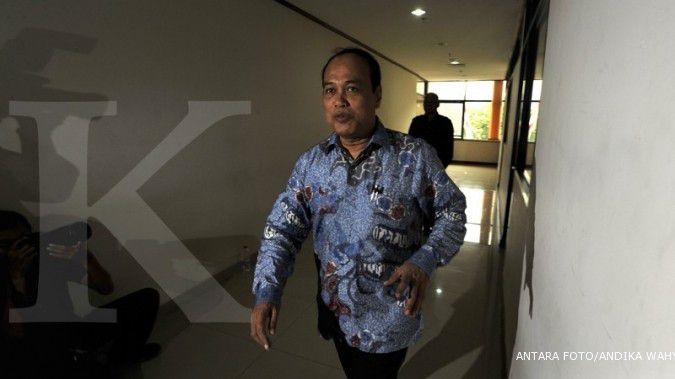JAKARTA. Known as the world’s largest archipelago with diverse natural settings, famed for its hospitality industry, and home to more than 140 golf courses with a wide variety of layouts, Indonesia wants to become Asia’s top golfing destination.
The Tourism and Creative Economy Ministry recently added golf to the category of special interest tourism that will be further developed and promoted in a bid to attract foreign golfers.
“The number of golf tourists is not as many as regular tourists, but this is a niche high yield market. We are working with the private sector to upgrade the golf courses and participate in golf trade shows, such as the latest Korea Golf Show, and will hold tournaments to promote our golf destinations,” the ministry’s meeting, incentives, convention, exhibition (MICE) and special interest tourism development director Achyarudin told The Jakarta Post.
He said that 51 out of 140 courses in the country have met international standards and were designed by world renowned course architects, including Bob Moore, Greg Norman, Graham Marsh and Jack Nicklaus. The courses are back-dropped by mountains, active volcanoes, oceans, lakes, forests and city skylines, strengthening Indonesia’s position as a golf destination.
According to the International Association of Golf Tour Operators (IAGTO), the global golf tourism market is worth over US$17 billion and an estimated 10 percent of the 56 million people who play golf worldwide travel overseas annually for the main purpose of playing golf.
IAGTO says that the Asia Pacific, including Indonesia, is poised to attract a good number of these golf travelers in the years to come.
He said that the ministry has yet to identify the number of golfers visiting the country as the golf division is in the pipeline, but the ministry’s information center data estimates that each golfer spends between $2,500 to $5,000 during their golfing holiday in Indonesia, higher than a regular tourist who spends around $1,133.
The ministry’s MICE and special interest tourism promotional director Rizky Handayani said that the government has set a target to bring in 50,000 golfers in 2014.
“We hope to reach the target before 2014 because we are aggressively promoting our golf attractions whenever we participate in trade shows and provide incentives to several golf schools such as in Korea and Japan,” Rizky told the Post.
She was optimistic the target would be met soon because Jakarta would host one of the world’s biggest golf events, the Asia-Pacific Golf Summit in November this year, bringing Indonesia to the forefront of the golf scene across the pacific region.
She also said that the ministry worked with golf operators including Indogolf Travel and Golf Wonderful Indonesia, and national flag carrier Garuda Indonesia who let any passenger bring their golf equipment at no extra charge, to attract more travelers.
Golf Wonderful Indonesia CEO Harmony Le Riche said that they expected to bring in 1,000 golfers a month with a 10 percent increase year on year. She said that most of the customers were inbound leisure golfers from Malaysia, Singapore, Australia, Korea, Japan, Thailand and China.
“We are now seeing more interest from Europe as a very big potential market and find they are interested in our longer stay packages for 10 days on average with combination destinations,” she said.
Besides the tour operators and Garuda, the hotel industry also played a vital role in helping the country to jump on the golf tourism bandwagon.
Hotel Mulia Senayan Jakarta and Tauzia Hotel Management were collaborating with some of the country’s best courses in order to deliver golf packages to the niche travelers.
Hotel Mulia Senayan worked with the Senayan Golf Club, while Tauzia, through its four star accommodation Harris Hotel, offered packages to play in Giri Gahana Golf Course (Bandung), Mountain View Golf Club (Bandung), Tering Bay Golf & Country Club (Batam) and New Kuta Golf Club (Bali).
Both Hotel Mulia public relations director Romy Herlambang and Tauzia spokeswoman Yani Sinulingga said that the market response was healthy with some travelers extending their stay just to play more golf.
Moreover, Indonesia Golf Association (PGI) spokesman Dian Mariyun said that he fully supported the government’s move because Indonesia was home to some of the finest courses across the globe yet it stayed under the golfing communities radar. (Nurfika Osman)
Indonesia wants to become major golf destination
August 26, 2013, 01.14 PM
/2012/10/25/506333880p.jpg)
ILUSTRASI. Nelayan melakukan bongkar muat hasil tangkapan laut di Pelabuhan Tulehu, Ambon, Maluku, Minggu (8/11/2020). ANTARA FOTO/Muhammad Adimaja/aww.
Source: The Jakarta Post
| Editor:
Latest News
-
February 07, 2026, 05.13 PM
Indonesia-Australia Relations: Booming Business, Golden Opportunities for Investors
-
February 07, 2026, 04.59 PM
Indonesian Comedian Summoned by Police Over Netflix Show
-
February 07, 2026, 05.57 AM
GLOBAL MARKETS-Stocks, Bitcoin Rally, Regaining Some Lost Ground with Precious Metals
-
February 06, 2026, 07.58 AM
Indonesian Markets Face More Pressure after Moody's Cuts Outlook
-
February 05, 2026, 07.19 PM
Moody's Cuts Indonesia's Sovereign Rating Outlook to Negative
-
February 05, 2026, 02.43 PM
Indonesia Posts Fastest Economic Growth Rate in Three Years
-
February 04, 2026, 04.38 PM
Indonesia's Tax Revenues Jump in January, Finance Minister Says
-
February 04, 2026, 03.34 PM
AUD 1.6 Trillion Australian Pension Funds Ready to Pour into Indonesia
-
February 04, 2026, 02.13 PM
Indonesian Miners Halt Spot Coal Exports Over Proposal to Cut Output














